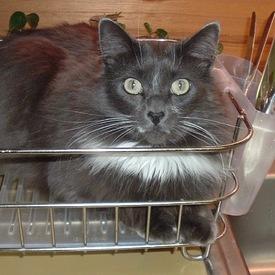Measurements help please - how much is a cup?!
Options

Maldivesbeachbodplease
Posts: 444
Hi all,
Just wondering how you measure a "cup of almond milk" for example. What size cup do you mean? or how many ml does it equate to?
thank you!
Just wondering how you measure a "cup of almond milk" for example. What size cup do you mean? or how many ml does it equate to?
thank you!
0
Replies
-
A cup is 8 ounces. Make sure you are using the right measuring tools depending on if you are measuring liquids or dry goods. I recommend getting a kitchen scale too. Last week I bought a "Eat Smart- Precision Pro" on amazon and I LOVE it. I use it multiple times a day, it really helps with keeping track of portion sizes and ease of tracking your food on MFP.0
-
8 fluid ounces, as mich says, use a liquid measuring cup. 8oz is roughly equivalent to 236ml
Measurement conversions are something you get used to when you pay a lot of attention to labels 0
0 -
I never got the whole cup measurement either but if its 8 ounces weither that be fluid or solid then:
8 fluid ounces = 236.58 (237) mls
8 solid ounces = 224 grams ( 1 ounce = 28 grams)
its means lots of maths for us europeans lol0 -
For nutrition labeling in the US, one cup is defined as 240 ml.
It's one of the old non-metric units of measure still widely used in the US. There's more info at http://en.wikipedia.org/wiki/Cup_(unit)0 -
protip: You can google search conversion.
For example:
10 cups in ml
or
136 miles in km0 -
when your searching for food in the data base but grams in the heading ie rice grams 9 times out of 10 it will give you the choices in grams thats what I do I never use the cup measurements.0
-
It's METRIC! In mL 1 cup is always 250 mL as a Litre is 1000 mL, and there are 4 cups in a Litre- it's a liquid measurement. Ounces are confusing!0
-
It's METRIC! In mL 1 cup is always 250 mL as a Litre is 1000 mL, and there are 4 cups in a Litre- it's a liquid measurement. Ounces are confusing!
how is Rice and flour and stuff like that measured in Cups on here then? you can only measure liquids in ml0 -
both cups and ml are measures of volume.
a cup is 8 fl oz (volume ounces)
so a cup of rice and 236ml of rice are the same.0 -
both cups and ml are measures of volume.
a cup is 8 fl oz (volume ounces)
so a cup of rice and 236ml of rice are the same.
That's what I taught thanks0 -
It's METRIC! In mL 1 cup is always 250 mL as a Litre is 1000 mL, and there are 4 cups in a Litre- it's a liquid measurement. Ounces are confusing!
Not quite.
(1) No, a cup is not metric. That's why the original poster didn't understand. A cup is a traditional English and American unit of measure, not a metric one.
(2) No, a cup is not always 250 mL. It's almost 250 mL, 240 mL to be precise as a previous poster said (for nutrition label purposes).
(3) Yes, a litre is 1000 mL.
(4) No, there are not four cups in a litre. There are about four cups in a litre.
(5) Yes, ounces are confusing. The main problem is that there are ounces of volume and ounces of weight. For fresh water at sea level at standard pressure and temperature, an ounce of volume weighs an ounce of weight. For everything else, an ounce of volume may weigh more or less than an ounce of weight.
From the US FDA regulations:For purposes of nutrition labeling, 1 cup means 240 mL, 1 tablespoon means 15 mL, 1 teaspoon means 5 mL, 1 fluid ounce means 30 mL, and 1 ounce means 28 g (21 CFR 101.9(b)(5)(viii)).
http://www.fda.gov/Food/GuidanceComplianceRegulatoryInformation/GuidanceDocuments/FoodLabelingNutrition/ucm063102.htm0 -
0
-
Grams in a cup depends on the density of the ingredient. Millilitres in a cup does not.
To go from cups to grams is converting volume to mass, so you have to know the density. To go from cups to millilitres is just converting one unit of volume to another. It's the same for every ingredient.
On that website, enter one cup, pick any ingredient, and the millilitres will always be 236.6. The grams and kilograms will change (more for dense foods, less for airy foods). A cup of castor oil is 224.8 grams and a cup of cake crumbs is only 89.9 grams. But both are 236.6 millilitres.0 -
All of this!It's METRIC! In mL 1 cup is always 250 mL as a Litre is 1000 mL, and there are 4 cups in a Litre- it's a liquid measurement. Ounces are confusing!
Not quite.
(1) No, a cup is not metric. That's why the original poster didn't understand. A cup is a traditional English and American unit of measure, not a metric one.
(2) No, a cup is not always 250 mL. It's almost 250 mL, 240 mL to be precise as a previous poster said (for nutrition label purposes).
(3) Yes, a litre is 1000 mL.
(4) No, there are not four cups in a litre. There are about four cups in a litre.
(5) Yes, ounces are confusing. The main problem is that there are ounces of volume and ounces of weight. For fresh water at sea level at standard pressure and temperature, an ounce of volume weighs an ounce of weight. For everything else, an ounce of volume may weigh more or less than an ounce of weight.
From the US FDA regulations:For purposes of nutrition labeling, 1 cup means 240 mL, 1 tablespoon means 15 mL, 1 teaspoon means 5 mL, 1 fluid ounce means 30 mL, and 1 ounce means 28 g (21 CFR 101.9(b)(5)(viii)).
http://www.fda.gov/Food/GuidanceComplianceRegulatoryInformation/GuidanceDocuments/FoodLabelingNutrition/ucm063102.htm
Just one more thing that seems to confuse those who use MFP and are used to measuring in metric units: the "eight cups of water" here refers to eight times 8 fluid ounces. This is approximately 2 liters.0 -
What's this 240ml -that a cup is ABOUT 250ml?
Ask a Canadian, who uses metric every day how much a cup is. It's 250ml. Metric and imperial don't equal out to be the same - and I'd go for metric being the more exact of the two when equating how many oz to ml since our numbers are even numbers and imperial are....so much more work than necessary.0 -
I'd never heard of a Canadian pseudo-metric cup that is defined to be 250 ml. Very interesting. I was talking about the United States, where for nutritional label purposes a cup is defined to be 240 ml.
From the US FDA regulations:For purposes of nutrition labeling, 1 cup means 240 mL, 1 tablespoon means 15 mL, 1 teaspoon means 5 mL, 1 fluid ounce means 30 mL, and 1 ounce means 28 g (21 CFR 101.9(b)(5)(viii)).
http://www.fda.gov/Food/GuidanceComplianceRegulatoryInformation/GuidanceDocuments/FoodLabelingNutrition/ucm063102.htm
Sounds like a cup grows by about 4% as it travels from Buffalo to Kitchener.
It sure is too bad that the American Revolution happened before the French Revolution. It would be so much easier if we used the metric system.0 -
It's METRIC! In mL 1 cup is always 250 mL as a Litre is 1000 mL, and there are 4 cups in a Litre- it's a liquid measurement. Ounces are confusing!
how is Rice and flour and stuff like that measured in Cups on here then? you can only measure liquids in ml
There are two kinds of measuring cups. Liquid measure and dry measure. While the amounts are similar, they are not exact, so you should always use the correct tool for the correct food item.
And things cannot be consistently converted from a volume measure to a weight measure due to density. A cup of honey will weigh more than a cup of water and a cup of marshmallows will weigh less than a cup of flour.
But if weight measurements are available, defer to those, as they will always be more accurate. 43 grams of dry rice will always be 43 grams of dry rice. But a half cup of dry rice (the supposed volume equivalent) can be 45 grams, 50 grams, 55 grams, etc, depending on how well packed the item is in the measuring cup.
And always be careful that you are using the correct measurement in regards to weight and volume when things are given in ounces. For example, if something calls for 8 oz of mini marshmallows - 8 oz by weight will be 4/5 of an average bag. 8 oz by volume will be about 1/5 of an average bag.0
This discussion has been closed.
Categories
- All Categories
- 1.4M Health, Wellness and Goals
- 396.4K Introduce Yourself
- 44.2K Getting Started
- 260.8K Health and Weight Loss
- 176.3K Food and Nutrition
- 47.6K Recipes
- 232.8K Fitness and Exercise
- 449 Sleep, Mindfulness and Overall Wellness
- 6.5K Goal: Maintaining Weight
- 8.6K Goal: Gaining Weight and Body Building
- 153.3K Motivation and Support
- 8.3K Challenges
- 1.3K Debate Club
- 96.5K Chit-Chat
- 2.5K Fun and Games
- 4.5K MyFitnessPal Information
- 16 News and Announcements
- 18 MyFitnessPal Academy
- 1.4K Feature Suggestions and Ideas
- 3K MyFitnessPal Tech Support Questions








